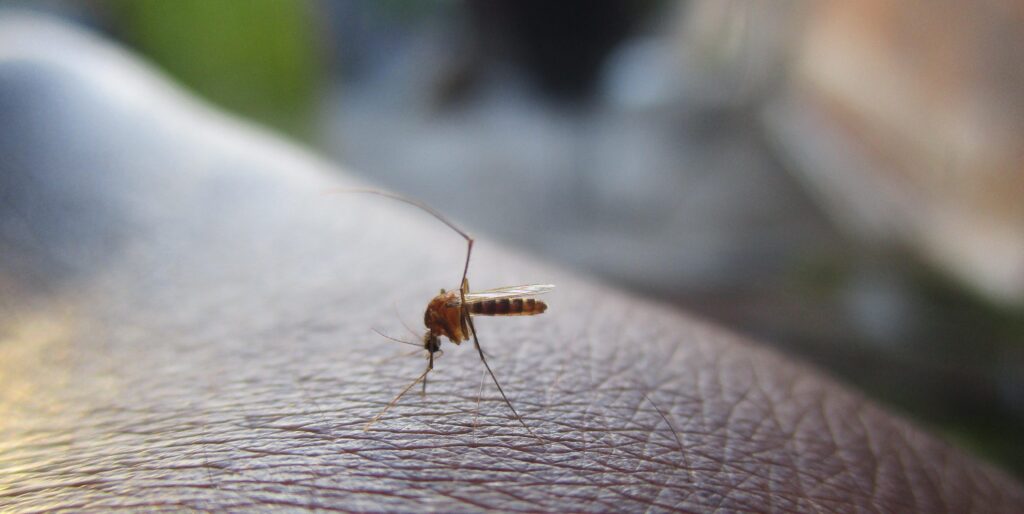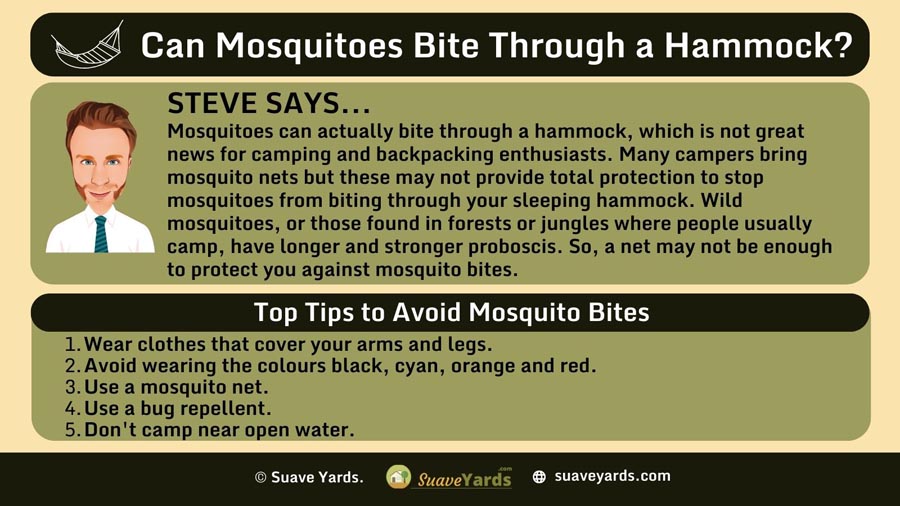
Imagine lounging in your hammock.
You are breathing in the fresh air and enjoying the sun on your face, but then you feel a small but punchy prick on your skin.
Yep, mosquitoes can be vibe killers!
The question is: can mosquitoes bite through a hammock?
Let’s find out.
Mosquitoes can actually bite through a hammock, which is not great news for camping and backpacking enthusiasts. Many campers bring mosquito nets but these may not provide total protection to stop mosquitoes from biting through your sleeping hammock. Wild mosquitoes, or those found in forests or jungles where people usually camp, have longer and stronger proboscis. So, a net may not be enough to protect you against mosquito bites.
Can Mosquitoes Bite Through a Hammock?

They can!
It sucks, and so do mosquitoes.
You know how jungle or wild animals are tougher than those we have at home? Wild mosquitoes are the same!
They have a longer and stronger proboscis that can pierce through a hammock.
Mosquitoes may be small but they can be deadly. Some have called them the most dangerous animal on earth.
Why Are Mosquitoes Dangerous?
Avoid mosquitoes at all costs because they are small but terrible insects.
Here are some of the reasons why you should protect yourself from mosquitoes:
1. Mosquito Bites Sting
People have different pain tolerance so some may consider mosquito bites negligible while others think they are quite painful.
But the sting usually leaves a mark, which is itchy and is sometimes worse than the actual pain from the sting.
Some people have a mild reaction to the bite while others develop a large swelling.
That’s just the tamest way mosquitoes inflict pain on people.
2. Mosquitoes Carry Dangerous Diseases
According to a report, 700,000 people die from mosquito bites every year.
It is not the bite that kills people but the virus or disease that mosquitoes carry and transmit to humans.
In a Healthline report, Dr. Omar Akbari of the Center for Disease Vector Research at the University of California Riverside said:
“Mosquitoes are perhaps the most dangerous animals in the world. They are the primary vectors of human diseases such as yellow fever, malaria, and dengue fever, which infect hundreds of millions of humans worldwide and kill millions each year.”
The following are the most dangerous diseases mosquitoes may transmit to humans:
- Chikungunya – a virus that causes patients to have fever and joint pain that sometimes include headache, muscle pain, and rash.
- Dengue – a disease that is endemic in around 100 countries with patients experiencing mild to severe symptoms, such as intense headache, high fever, muscle and joint pain, nausea, fatigue, abdominal pain, and vomiting. The worst cases end in death.
- Malaria – a disease that causes victims to experience fever, headache, and chills 10 to 15 days after being bitten. Some cases result in death.
- West Nile Virus – the majority of people with the West Nile Virus don’t have symptoms but a fifth may experience stiff neck, muscle weakness, tremors, convulsions, fever, and headache. Severe infection may result in encephalitis or meningitis.
- Yellow Fever – a disease that causes jaundice or yellowing of the skin and sclera or the eyes, along with symptoms such as headache, fever, muscle pain, and nausea.
- Zika – a virus that often doesn’t result in symptoms, although some patients would experience headache, fever, muscle and joint pain, rash, and conjunctivitis. Pregnant people infected with Zika are at risk of miscarriage or having a preterm birth.
3. Mosquito-Transmitted Diseases Are Hard to Prevent

Scientists may have figured out the viruses and diseases that mosquitoes transmit to humans but there are still no vaccines to prevent them.
It’s another reason why mosquitoes are feared because they are too small to fight off and there are no ways to prevent the diseases once the virus is in a person’s system.
In some cases, people may not even know they have a mosquito-transmitted disease until it’s too late because of the lack of symptoms.
This is a perfect example of why prevention is important.
How to Prevent Mosquito Bites While Hammocking
Now that it has been established that mosquitoes are dangerous, you have to protect yourself while hammocking.
There are so many ways to protect yourself, too, which is great.
So what should you do?
1. Wear Clothes!
Many campers may be tempted to sleep with minimal clothing while camping during summer.
Knowing what you know now, you must wear clothes that cover almost every inch of your body.
A mosquito’s proboscis may pierce through a hammock but it is not so long that it could reach the skin through the hammock and your clothing.
2. Avoid Certain Colors
Wearing clothes is not enough, you need to know the right color too.
According to a study, mosquitoes are attracted to certain colors when attached to carbon dioxide from human breath.
What colors should you avoid?
- Black
- Cyan
- Orange
- Red
Jeffrey Riffell, the senior author of the study, said:
“Mosquitoes appear to use odors to help them distinguish what is nearby, like a host to bite. When they smell specific compounds, like CO2 from our breath, that scent stimulates the eyes to scan for specific colors and other visual patterns, which are associated with a potential host, and head to them.”
3. Use Mosquito Net
A mosquito net protects you from mosquitoes, duh!
It can also protect you from bugs and other flying insects.
There are some mosquito nets that go around the whole hammock so the flying insects have no chance of biting you.
4. Use Bug Repellent
You can spray bug repellent on yourself and spray some on your hammock.
Some may not like mosquito repellent on their skin because of the chemicals but there are many organic options in the market.
5. Apply Permethrin on the Hammock
Permethrin is a type of insecticide that doesn’t just keep mosquitoes away but all types of bugs as well.
It is available in spray or crystal form.
So, you can either spray the hammock with permethrin or dilute the permethrin in water and soak the hammock and dry it.
Either way, you will have an insect-free hammock.
6. Don’t Camp Near a Body of Water

Mosquitoes lay their eggs in open water, so you know that it’s where many of them congregate.
Just avoid the area to steer clear of the mosquitoes.
7. Light Some Citronella Candles
Okay, this is not ideal in all situations.
If you have to light candles, you must consider where you are and if there are flammable objects in sight.
When camping, for example, make sure your candle is in a stable holder and it won’t light leaves and foliage on fire.
But candles are certainly romantic in a beach setting, if that is where you are hammocking.
8. Install Some Mosquito Gadgets
For a hammock you set up at home, it is best complemented with mosquito gadgets like an insect trap or bug zapper.
Both gadgets kill mosquitoes and prevent them from breeding.
9. Chew Mint
Remember that mosquitoes are attracted to the carbon dioxide we exhale from our mouths.
You can mask the carbon dioxide scent by chewing mint, whether you choose mint leaves or mint candy, or gum, that’s up to you.
10. Take Some Oranges With You
Apparently, mosquitoes can’t stand the scent coming out of the orange peel.
You can snack on some oranges and leave the peel near you.
Better yet, rub some of the peel on your skin to naturally repel mosquitoes.
Final Thoughts

Mosquitoes are annoying and dangerous!
But you can’t give up hammocking just because mosquitoes are around and can bite through the material.
With that mindset, you might as well give up all the activities you love since mosquitoes are never going away.
The best thing to do is to protect yourself from them.
Protection is quite simple too.
